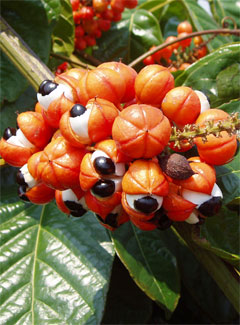|
|
Guarana: A South American Stimulant and A Dietary Supplement

Guarana is a climbing plant. The word guarana comes from the Guaraní word
guara-ná, which has its origins in the Sateré-Maué word for the plant, warana,
that in Tupi-Guarani means "fruit like the eyes of the people".
Guarana plays an important role in Tupi and Guaraní Paraguayan culture.
According to a myth attributed to the Sateré-Maué tribe, guarana's domestication
originated with a deity killing a beloved village child. To console the
villagers, a more benevolent god plucked the left eye from the child and planted
it in the forest, resulting in the wild variety of guarana. The god then plucked
the right eye from the child and planted it in the village, giving rise to
domesticated guarana.
According to the Biological Magnetic Resonance Data Bank, guaranine is defined
as only the caffeine chemical in guarana, it is identical to the caffeine
chemical derived from other sources, for example coffee, tea, and maté.
Guaranine, theine, and mateine are all synonyms for caffeine when the
definitions of those words include none of the properties and chemicals of their
host plants except the chemical caffeine. Natural sources of caffeine contain
widely varying mixtures of xanthine alkaloids other than caffeine, including the
cardiac stimulants theophylline and theobromine and other substances such as
polyphenols, which can form insoluble complexes with caffeine. The main natural
phenols found in guarana are (+)-catechin and (-)-epicatechin.
Guarana is used in sweetened or carbonated soft drinks and energy shots, an
ingredient of tisanes or contained in capsules. Generally, South America obtains
most of its caffeine from guarana. Brazil, which is the third-largest consumer
of soft drinks in the world, produces several soft drink brands from guarana
extract. The Portuguese word guaraná is widely used in Brazil as a reference to
soft drinks containing guarana extract.
As guarana is rich in caffeine, it is of interest for its potential effects on
cognition. In rats, guarana increased memory retention and physical endurance
when compared with a placebo. A 2007 human pilot study assessed acute behavioral
effects to four doses (37.5 mg, 75 mg, 150 mg and 300 mg) of guarana extract.
Memory, alertness and mood were increased by the two lower doses, confirming
previous results of cognitive improvement following 75 mg guarana.
In the United States, guarana has received the designation of "generally
recognized as safe" by the American Food and Drug Administration. Preliminary
research has shown guarana may affect how quickly the body perceives itself to
be full. One study showed an average 5.1 kg (11.2 lb) weight loss in a group
taking a mixture of yerba mate, guarana, and damiana, compared to an average
one-pound loss in a placebo group after 45 days. Although inconclusive about
specific effects due only to guarana, this study differs from another showing no
effect on body weight of a formula containing guarana.
 Guarana extract reduced aggregation of rabbit platelets by up to 37 percent
below control values and decreased platelet thromboxane formation from
arachidonic acid by 78 percent below control values. It is not known if such
platelet action has any effect on the risk of heart attack or ischemic stroke. Guarana extract reduced aggregation of rabbit platelets by up to 37 percent
below control values and decreased platelet thromboxane formation from
arachidonic acid by 78 percent below control values. It is not known if such
platelet action has any effect on the risk of heart attack or ischemic stroke.
Guarana is used for weight loss, to enhance athletic performance, as a
stimulant, and to reduce mental and physical fatigue. It is a frequent addition
to energy and weight loss products. Some people also use guarana to treat low
blood pressure and chronic fatigue syndrome (CFS), and to prevent malaria and
dysentery. It is also used to enhance sexual desire, to increase urine flow, and
as an astringent.
Other uses include treatment of ongoing diarrhea, fever, heart problems,
headache, joint pain, backache, and heat stress. In food manufacturing, guarana
has been used as a flavoring ingredient in beverages and candy.
Guarana contains caffeine. Caffeine works by stimulating the central nervous
system (CNS), heart, and muscles. Guarana also contains theophylline and
theobromine, which are chemicals similar to caffeine.
Many people would assume that with all these benefits there has to be some side
effects, but in this case, other than some people experiencing jitters, there
are no known side effects for the general population. Guarana is considered safe
for most people. The only people who should use caution are those with
predisposed heart conditions. In these cases, consuming too much caffeine in any
form can lead to seizures. It's also wise to use caution if you experience heart
palpitations after taking Guarana.
Video
Dated 25 November 2013
|
|
|
|
|









